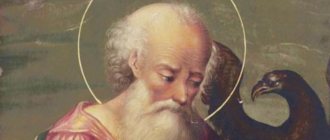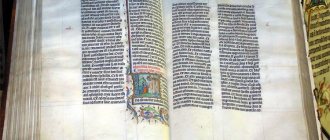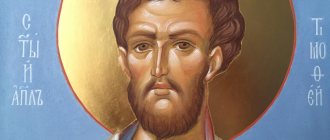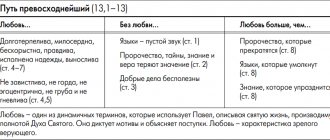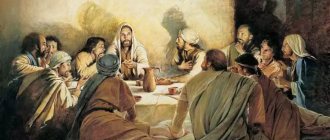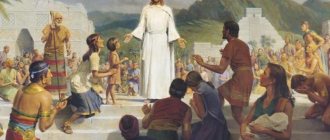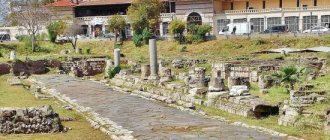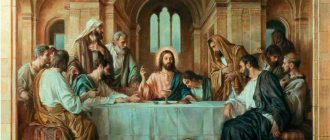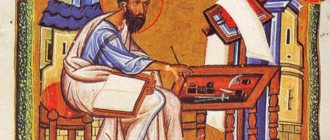Time and Place of Writing of First Timothy
We know that Paul's apostolic travels took place between the years 48-56. During 56 - 60 years. Paul went through the Roman courts. From 61 to 62 he was imprisoned in Rome. Apparently Paul was released in 62, after which he immediately went on a journey. At this time, his faithful disciples looked after the communities: Timothy in Ephesus, and Titus in Crete. The Holy Apostle Paul wrote letters to them during his journey (63 - 66).
Who is Timofey?
As follows from the book of the Acts of the Apostles, Timothy was the son of a Jewish woman and a Greek father. He was born and lived in Lystra. It is known that his mother and all his maternal relatives sincerely believed in Christ.
During his first apostolic journey, Paul visited Lystra and began to patronize Timothy, becoming his spiritual father. Timothy traveled with Paul and was his faithful assistant. Timothy is mentioned in other letters of Paul.
Saint to whom the Apostle Paul wrote twice
In the southwest of Asia Minor lie the ruins of the ancient city of Ephesus, which existed for two and a half thousand years, of which one and a half thousand are associated with Christian history. Its first bishop was the Apostle Timothy, whose name is known to most Christians thanks to the two corresponding letters of the Apostle Paul. There is reason to say a few words about the Apostle Timothy, since on February 4 the Orthodox Church honors his memory.
In] modern Turkey[/anchor] there was once the Roman province of Lycaonia, it was here that the future apostle of the 70 was born, here, most likely, he was converted to Christianity by the Apostle Paul when he visited the Lycaonian cities with an evangelical sermon during his first missionary journey. This is what the book of Acts says about Paul and Barnabas: “When the Gentiles and Jews with their leaders rushed against them to shame and stone them, they, having learned about this, withdrew to the Lycaonian cities of Lystra and Derbe and their surroundings, and there they preached the gospel" (Acts 14:5-7).
The seed sown by the Apostle Paul yielded wonderful fruit, and already on his second missionary journey, local Christians advised him to take Timothy with him. Subsequently, he becomes not only Paul’s closest disciple, but a friend and associate, sharing with him the work of preaching, arrests, and other sufferings.
Ruins of the city of Ephesus. The territory of modern Turkey, near the city of Selcuk. Photo: loveyouplanet.com
Before Timothy himself became the recipient of Paul's epistles, he played a decisive role in the appearance of the First Epistle to the Thessalonians. At first, Timothy, together with the evangelist Luke, was Paul’s companion in Macedonia and Achaia (today the pronunciation Achaea is more accepted - the south of modern Greece). When the apostles arrived in Athens, Paul sent Timothy to Thessalonica, and he himself went to Corinth. As a result of the news brought by Timothy, the aforementioned message appeared, the text of which testifies to this:
“Now, when Timothy came to us from you and brought us good news about your faith and love, and that you always have a good memory of us, wanting to see us, just as we do you, then we, in all our sorrow and need , brethren, we were comforted by you because of your faith; for now we are alive, as you stand in the Lord” (1 Thess. 3:6-8).
As we see, the Thessalonian Christians distinguished themselves by their piety and steadfastness in the faith, but the Apostle Paul not only praises them, but also reproaches them, because Timothy also told him about the problems of the community. These problems were of both a moral and doctrinal nature. Regarding the first, it must be said that these were such fairly common vices as fornication, greed and idolatry. But with regard to the latter, everything was a little more interesting.
Some Christians began to spread the idea of the imminent Second Coming of Christ and hoped to meet the Savior during their lifetime. Because of this, they refused to engage in useful work. The situation was further aggravated by the fact that those who died without waiting for Christ were considered rejected by God. The Apostle Paul devotes a lot of text in his letter to instructions for correcting these shortcomings. So, for example, holy. John Chrysostom says that Paul writes about the general resurrection not because the Thessalonians did not believe in it, but because they greatly mourned the dead, thereby indulging in immoderate grief.
Thessaloniki. Crypt. Church of St. Demetrius. The territory of the modern city of Thessaloniki, Greece. Photo: grekomania.ru
From Corinth, the Apostle Paul goes to Syria and then to Palestine, as he planned to convey material assistance to poor Christians. On this journey, Timothy accompanies Paul to the city of Philippi, in the north of modern Greece. Here we come across a gap in information about the life of Timothy, and further mention of him refers to the first arrest (chain) of Paul in Rome.
We read about the release of the apostles from captivity in the Epistle to the Hebrews: “Know that our brother Timothy has been released, and I, together with him, if he comes soon, will see you” (Heb. 13:23). This happened in 64, after which Paul decides to fulfill his long-standing desire and visit the Christian communities he founded.
Around the year 65, he arrives in Ephesus where, according to Tradition, he ordains Timothy as a bishop: “For this reason I remind you to rekindle the gift of God, which is in you through my ordination” (2 Tim. 1:6). From the words: “And now there is laid up for me a crown of righteousness, which the Lord, the righteous Judge, will give me on that day; and not only to me, but also to all who loved His appearance. Try to come to me soon” (2 Tim. 4:8-9) - we see that Paul, during his re-arrest, anticipating his imminent death, asks a close friend to come to him for the last meeting. It is very likely that Timothy was indeed close to his teacher at the time of his martyrdom.
Tradition tells us that Timothy led the Ephesian community for about fifteen years and died around the year 80. This happened either during the reign of Emperor Vespasian or his successor, Domitian. A celebration took place in Ephesus in honor of the goddess of hunting and fertility, Diana. As often happens in pagan celebrations, there was some debauchery here too. The Apostle Timothy courageously tried to stop the crowd of idolaters through an accusatory and edifying sermon, for which he was beaten to death with sticks and stones.
Martyrdom and burial of St. Timothy the Apostle. Book miniature, 10th century. Menology of Vasily II. Photo: ruicon.ru
Let us now focus our attention on the two letters of the Apostle Paul to Timothy. For obvious reasons, I will not undertake a detailed analysis, but since we are talking about the personality of Timofey, I think it’s worth talking about what became the reason and purpose for writing them.
So, after Timothy took over the Ephesian Christians, Paul went to Macedonia. The young bishop soon encountered heretical ideas that came from both Jewish and pagan environments. Subsequently, they formed the basis of Gnosticism.
From the First Epistle we see that these false teachers rejected the Divine dignity of Christ and the resurrection of the dead, considered the human body to be the source of evil, and therefore despised marriage and family relationships. Their asceticism was hypocritical and feigned. In order to help Timothy understand all this and teach him the True Teaching, the Apostle Paul writes the epistle in question. In addition, it also contains a number of pastoral instructions that remain of continuing relevance for modern clergy.
Most likely the letter was written from Macedonia in the year of Timothy's ordination.
Regarding the reasons and purposes of writing the Second Epistle, I have already briefly mentioned - it was the time of the second arrest of the Apostle Paul. At that moment, only Luka remained with him. It was hard for Paul, not being able to continue his missionary work, to endure the loneliness of imprisonment, but he not only asks Timothy to come to him, but also courageously instructs him to continue his zealous pastoral service, inspiring him to fight for his flock in the face of impending trials: “So, be strengthened, my son, in the grace of Christ Jesus... Endure suffering as a good soldier of Jesus Christ... Flee youthful lusts, but hold on to righteousness, faith, love, peace with all who call on the Lord from a pure heart" (2 Tim. 2:1...8... 22).
The words of the Apostle Paul from the next chapter sound very relevant for our time: “Know this, that in the last days difficult times will come. For people will be lovers of themselves, lovers of money, proud, arrogant, slanderers, disobedient to parents, ungrateful, unholy, unfriendly, unforgiving, slanderers, intemperate, cruel, not loving what is good, traitors, insolent, pompous, lovers of pleasure rather than lovers of God who have a form of godliness, and denied his powers” (2 Tim. 3:1-5). Only today many people do not even have the appearance of piety, and many vices are considered the norm. On the one hand, this is a little scary, on the other hand, it inspires us to show greater and greater fidelity to the Truth, the bearers of which the Lord blessed us to be.
We have someone to look up to. Our martyrs, confessors, saints and saints serve as an example to us. But in the beginning there was Christ and His apostles, who embodied in their images all subsequent Christian exploits. All that remains is for us, to the best of our strength, to be their worthy followers and students.
The purpose of writing the Epistle to Timothy.
The main purpose of the letter is to encourage and edify Timothy. As far as can be judged from the sources that have reached us, Timothy was a shy and timid young man. In his letter to Timothy, Paul encourages him to be more courageous and active, more confident in his actions.
First Epistle to Timothy: summary.
Chapter 1. Warm greetings. Instructions to Timothy regarding the activities of false teachers. Reflections on the experience of grace.
Chapter 2 Paul gives practical advice about behavior in the church: how to pray, the rights and behavior of women and men.
Chapter 3. Instructions for deacons and bishops. Church and truth.
Chapter 4. About apostasy and faithful service to Christ.
Chapter 5. Practical advice on the behavior of people of different ages and social status in the church. Instructions to widows and elders.
Chapter 6. Paul's Discourses on Slaves and Masters, Heretics and the Covetous. A call to Timothy to be faithful to Jesus and the Church.
The Question of the Authenticity of First Timothy
Despite the fact that the Church Fathers confirmed the authenticity of the First Epistle to Timothy, many Western biblical scholars doubt that the First Epistle to Timothy belongs to the Apostle Paul. Researchers base their point of view on the fact that many of the words and thoughts expressed in this message differ from what the Apostle wrote. Moreover, the false teachings spoken of in the epistle, as well as the very structure of the church as the author describes it, resemble the teachings and structure of the Church of the 2nd century, and not the 1st century, when Paul lived.
A group of scholars argue that the First and Second Epistles to Timothy, as well as the Epistle to Titus, belong to the pen of a single author who lived in the second century and deliberately posed as Paul. Researchers believe that the substitution of authorship was necessary to give greater authority to the Epistles, the purpose of which was to unite the Christian Church. In addition to lexical inconsistencies, one can easily notice that the author of the three apostolic epistles and the Apostle Paul differ in points of view on many issues, for example, on the issues of marriage and equality of men and women, on remarriage of widows, etc.
The epistles present a church hierarchy that emerged long after Paul's death.
It is worth saying that among modern scholars there are those who defend Paul's authorship, arguing that the hierarchy in the church began to emerge during Paul's lifetime, as indicated in Acts. The lexical differences are explained by the fact that the Pastoral Epistles were written much later than other epistles.
1st Epistle of the Apostle Paul to Timothy
1
Let all those who, like slaves, are under the yoke, consider their masters worthy of all honor, so that the name of God and the teaching are not blasphemed.
2
Those who have faithful masters, let them not neglect them, because they are brothers, but let them serve them even more diligently, because those who receive benefits from them are faithful and beloved. Teach and exhort this,
3
If anyone spreads other teachings and does not heed the sound words of our Lord Jesus Christ and the teaching consistent with godliness -
4
he has fallen into pride, knows nothing, but is infected with the disease of disputes and word disputes, from which there are envy, quarrels, blasphemies, crafty suspicions,
5
debates between people with depraved minds, alien to the truth, who think that piety is a source of profit.
6
But it is a great gain to be pious and content:
7
for we have brought nothing into the world; It’s obvious that we can’t take anything out of it.
8
Having food and clothing and shelter, let us be satisfied with this.
9
But those who desire to get rich fall into temptation and a snare, and into many foolish and harmful lusts, which plunge people into ruin and destruction,
10
For the root of all evil is the love of money, by indulging in it some have strayed from the faith and caused themselves many acute sufferings,
11
You, a man of God, avoid this, seek righteousness, piety, faith, love, patience, meekness.
12
Fight the good fight of faith, hold fast to eternal life to which you were called and for which you made a good confession before many witnesses.
13
I enjoin upon you before God, who gives life to all things, and before Christ Jesus, who testified a good confession before Pontius Pilate,
14
to keep the commandments blamelessly and blamelessly until the appearing of our Lord Jesus Christ,
15
which in due time the blessed and only Sovereign, the King of kings and Lord of lords, will reveal,
16
the only one who has immortality, who dwells in the unapproachable light, whom no one has seen and cannot see. To him is honor and eternal power, amen.
17
Instruct the rich in this age not to be arrogant and not to place their hope in the strength of wealth, but in God, who gives us everything abundantly for our enjoyment;
18
let them do good, be rich in good deeds, be generous, sociable,
19
laying up for yourself a treasure, a good foundation for the future, in order to achieve true life.
20
O Timothy, preserve what has been entrusted to you, turning away from idle talk and disputes of false knowledge that is displeasing to God,
21
following which some apostatized from the faith. Grace be with you.
